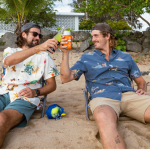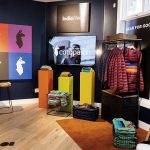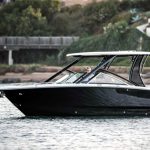The irony is unmistakable. In the end, the company that promised to break new ground in establishing a sustainable business model could not sustain itself. Nau Inc., launched in 2005 as Under the Wire, promised to make lasting change in how companies design and bring product to market. Its pledge to build a sustainable business model from the ground up was a siren song to some of the sporting goods industrys best talent. But it now appears the ventures insatiable appetite for capital — it burned through $34 million in cash and was on its Series D round of financing when it suddenly folded last week (see SEW_0818) — doomed it from the beginning.
Its co-founders included Eric Reynolds, a co-founder of Marmot, and Jill Zilligen, who helped run Patagonias “one for the planet” program. The ventures board of directors included chairman Steven Gomez, who became an industry legend by growing Nikes apparel business tenfold to $3 billion. Even so, when the company told potential investors that it would build 50 stores and burn through $100 million in cash by late 2009 before breaking even, many were skeptical.
The most hotly contested aspect of Naus business plan was its “ship-to-you” retail strategy, which aimed to harness the Web to significantly reduce the companys carbon footprint. The idea was to build up to 50 small stores across the country where the company could showcase its brand. Customers could buy stocked merchandise, but were offered a 10% discount if they ordered online. This strategy allowed Nau to reduce its store size to 2,000 square feet, which lowered energy usage. The other big initiative was a corporate giving program that donated 5% of every sale to non-profits, which customers could choose from a list of ten causes screened by the company.
Industry observers contacted last week universally praised the companys brave vision and marketing, but said its business model was flawed from the beginning because it sought to change too much, while growing too fast. That made it very capital intensive, said Robert Farinholt of Silver Steep Partners, an investment boutique that specializes in bringing outdoor companies and investors together. “Nau seemed to have as aggressive a retail rollout strategy as a Zumiez (which opened 50 stores in 2007), although without nearly the same access to capital or store economics,” said Farinholt.
Others questioned the companys minimalist approach to branding, which included not putting a logo on any of its apparel. “To go with a no branded, very laid back approach into retail and then to believe the consumer would be happy to wait three days to put on a garment after trying it on was probably not realistic,” said Ken Barker, a principal at Meriwether Capital Partners, which passed on investing in the company on three separate rounds.
Meriwether passed on Nau, because it perceived it was top-heavy, yet lacked the sourcing expertise it needed to pull off its ambitious plans.
Ian Yolles, director of marketing for Nau, said the company proved two aspects of its business model are viable. Company data show that 45% of its customers were opting to have product shipped, well ahead of projections. Secondly, 93% of its customers took the time to select a non-profit at checkout, rather than delegate the choice to Nau. In the end, Nau donated $250,000 to non-profits, indicating it had sold about $5 million in merchandise, far short of its own plan.















